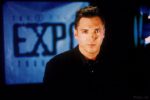Jun-25-1998
L.A. Weekly
The Truth Is Out There At a Theater Near You
Manohla Dargis
There’s a scene in the big-screen version of the television show The X-Files when Fox Mulder (David Duchovny), the good-looking FBI agent with a permanent case of the heebie-jeebies, steps into a back alley, unzips and pisses on a peeling, crusted poster for Independence Day. Independence Day earned a lot of money for Fox, the same studio that produced The X-Files, but its creative team of producer Dean Devlin and director Roland Emmerich made their next movie with Sony (a little something called Godzilla), which helps to explain Mulder’s target. He – and the movie’s makers – needn’t have bothered.
The X-Files is better than Independence Day – better acted, directed, written. It’s even better looking. No surprise there: The X-Files has always been better than Independence Day. Except that now The X-Files is motion-picture big, with looming long shots, ear-ringing sound and a bombastic (a mistake, I think) score. The weird thing is, it’s still a TV show, and plays much like the repeat episode that aired last Sunday night. “Horrible killings lead Mulder to evidence of extraterrestrial life,” is how the newspaper guide described that particular episode. It might as well have been describing every third show broadcast over the last five years, or, for that matter, the movie itself.
In the film, as on television, FBI agents Fox Mulder and Dana Scully (Gillian Anderson) are again ensnared in a complex plot involving aliens, U.S. government agencies and a cabal of sinister-looking white men called the Syndicate, Bohemian Club types who like to hang out in underlit rooms and speak in clipped, cryptic sentences. Among the familiar characters who contrive around them are Cancer Man (the wonderful William B. Davis, here credited genteelly as the Cigarette-Smoking Man), the Well-Manicured Man (John Neville), Skinner (the underused Mitch Pileggi), as well as the three conspiracy geeks who essentially function as Mulder’s own personal groupies (Dean Haglund, Tom Braidwood, Bruce Harwood). Rounding out the cast are solid character actors such as Martin Landau, Terry Quinn and, too briefly, Glenne Headly.
Written by series creator Chris Carter and directed by series regular Rob Bowman, the movie includes faces and story lines familiar from the program, along with some of the sniggering gore that helps keep the show safe from the Masterpiece Theater crowd. The production design is more ambitious than it is on television, though at times it feels as if the filmmakers were trying too hard to load the movie with epic grandeur. Duchovny easily holds the screen, just as he did in The Rapture and his handful of other features.
Anderson, whose extraordinary face can seem lit from within, here seems vaguely uneasy in some of her scenes, although that may be because the costume designer has tailored her clothes too tight, and in one ridiculous instance put the actress in heels better suited for a fetish ball than an FBI hearing.
Writing for The New York Times Magazine, the Times book-review editor Charles McGrath recently ventured that the popularity of The X-Files could be chalked up to a “nostalgia – for a time (which may never have existed, really) when a belief in global conspiracy held out the promise of a universe that could be comprehended.” I’m not sure under which dust jacket McGrath has been hibernating, but it does seem a little strange that anyone, even an editor at the paper of ostensible record, could assert, in the age of Waco, Timothy McVeigh, Vince Foster, Iran-contra, the Gulf War, the president named Bill Clinton, the conglomerate known as Time-Warner and the battlefield once known as Yugoslavia, that a belief in global conspiracy could in any respect be considered nostalgic.
Paranoia is as American as apple pie, baseball and assault rifles. In an essay first delivered at Oxford in November 1963 and pointedly titled “The Paranoid Style in American Politics,” historian Richard Hofstadter wrote that American political life has repeatedly served as “an arena for uncommonly angry minds . . . I call it the paranoid style simply because no other word adequately evokes the qualities of heated exaggeration, suspiciousness, and conspiratorial fantasy that I have in mind.” You’d be hard-pressed to come up with a better explanation than this for Reagan’s reign, the main of Oliver Stone’s oeuvre, any number of covers for The Nation, or, indeed, the mind of Fox Mulder, a paranoiac whose personal trauma (his kid sister was, so it seems, snatched by aliens) has set him on a righteous crusade in which, he believes, the lives of millions are at stake.
It’s the brilliance of The X-Files to have turned Mulder’s paranoid style into a function of cool. Mulder and Scully aren’t just beautiful, smart, well-armed and seemingly impervious to the banalities of everyday life, such as cheap haircuts and ruinous love affairs – they’re cool. Special agents in dark, sweeping coats, they are at once privy to some of the world’s most arcane secrets and – this is crucial – completely powerless to do anything about them. The show’s signature, at times near-affectless performance style is intrinsic to its creepy, droning atmosphere. It’s also crucial to the sense that, in the end (to quote yet another TV series), resistance is futile.
McGrath calls Mulder a zombie, but that’s a mistake. If anything, he’s the modern reincarnation of the postwar lonely man, an alienated company man who clocks in for an organization he can neither quit nor believe in. Scully, in turn, as with so many countless single women, buries herself in work and may or may not be in love with the wrong man (in another life, she’d be a nun). They’re solitary searchers whose deepest emotional connections are with each other, their co-workers, which makes them two of the more realistic characters inhabiting prime time.
The low-frequency hum that passes for emotion on The X-Files may seem almost Bressonian when compared to the overheated style of most TV acting, but over the years Mulder and Scully have found plenty of cause to tear away their masks. It’s noteworthy that Mulder, who lost his father, and Scully, whose sister was killed and who herself was stricken by a mysterious cancer, are the show’s most important casualties. That the two often operate at an emotionally low register indicates their professionalism (big agents don’t cry), but, critically, their blankness also serves as a reminder that Mulder and Scully are more spectators to the surrounding madness than active participants. Which, more than anything else, explains their appeal to the some 20 million Americans who every week hitch a ride on their tribulations.
Unlike The Twilight Zone, the show to which it is most often compared, The X-Files conveys no great moral urgency; nothing ever seems really at stake – the environment, civil liberties, nuclear proliferation, freedom. You never get a sense that Chris Carter or any of the other writers are particularly passionate about anything outside of goosing the audience and telling a ripping great story. That disinterestedness might serve as a warning sign for a deeply imbedded political conservatism, but The X-Files, with its confusion of right, left and crackpot-think, is beyond ideology. (Often it’s often beyond sense.) In the end, the most radical thing about the show is its refusal to adhere to the inherent precepts in mass culture that everything be understandable and remediable: stasis, crisis, group hug.
Week after week, nothing is understandable on The X-Files and nothing is remediable – at times, one senses, even to the program’s writers. This, as well as the show’s rejection of easy solutions, allows The X-Files to push into the marvelous, the grotesque and, on occasion, the sublime. An episode starring Peter Boyle counts as some of the best television I’ve ever seen; the episode with the three inbred brothers ranks among the best E.C. Comics ever written. It’s that not knowing, far more than the show’s apparent gift for surfing the edge of our collective consciousness, that seizes the imagination. For all their focus on the machinations of power, the creators of The X-Files aren’t all that interested in global conspiracies or nostalgia for the same. They just want our attention.


